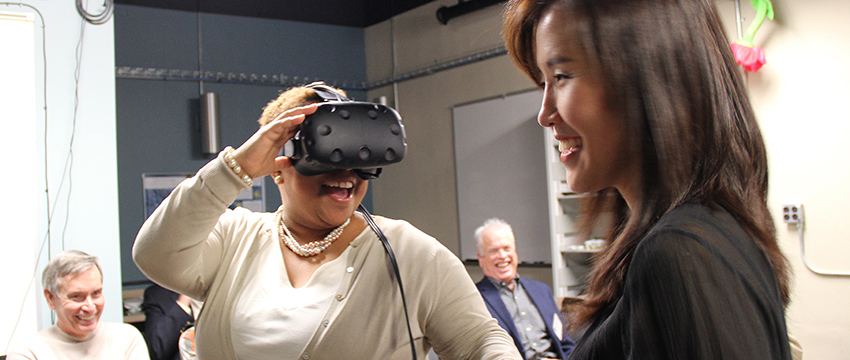Grace Ahn receives grant for social VR conference

Grace Ahn receives grant for social VR conference
Sun Joo (Grace) Ahn, a professor in the Department of Advertising and Public Relations at Grady College, has received a $150,000 grant from the Alfred P. Sloan Foundation to create an international, invitation-only conference focused on social interaction in virtual reality spaces, popularly known as the metaverse.
The grant was awarded to Ahn and Dr. Bree McEwan from the Data Sciences Institute at the University of Toronto, and will provide critical support for the Questioning Reality: Explorations of Virtual Reality and Our Social Future conference in April 2024. The conference will bring together leading scholars, industry professionals and enthusiasts to collaboratively shape the future research landscape of VR.
While there are numerous VR studies within the realm of engineering and computer science, there is now increased focus on the social science element to VR. Initially, VR was more of an individual activity where people put on headsets and viewed a video. Now, there is a push toward a much more social space where multiple users meet in the same virtual space.
“There isn’t a lot that we know about these social spaces right now,” Ahn said. “The conference will focus on the social interactions that take place within these virtual environments and how these social interactions impact the way that people not only experience the virtual world, but also how they feel outside of that virtual world.”
The conference will pair younger scholars together with more established scholars who will serve as mentors during the conference. Mini-grants will be awarded to early career scholars who will serve as Fellows, working before and after the conference. The conference will also bring together scholars in a range of disciplines including engineers, computer scientists, psychologists and socialists, just to name a few.
“Scholars bring a very rich array of things that you can relate to the metaverse spaces. This conference will bring scholars together for conversations that will seed new and exciting projects to build on for the following year,” said Ahn, who also directs the Center for Advanced Computer-Human Ecosystems at the University of Georgia.
McEwan also noted, “We’re laying the groundwork for the future of virtual reality research, where the synergy between scholars and industry experts shapes the very essence of the future of immersive communication.”
Ahn and McEwan anticipate deliverables as a result of the conference, including a “Debates in Digital Media” edition, focused on Virtual Reality and a white paper.
Another benefit of a conference like this is the ability for communication scholars to apply their knowledge in more specific ways.
Ahn continued, “I have found that a lot of the communication scholars feel like they are not very technologically-oriented or they don’t do VR, but humans are humans whether it’s in a VR space or outside of it — the important thing is the way that we socialize and interact. We are interested in studying how those communication patterns and interactions change within the social VR world, and how that transfers into physical space.”
Scholars agree there is a lot more flexibility in the metaverse than in the real world. In the metaverse, people can change their identity or their perspectives. They can really play with that dimension of both time and space by traveling to the past or to the future.
“Your value system will remain very similar to who you are in the real world,” Ahn said, “but you have extra tools to interact in novel ways, so that will change the way that you interact with people. We are interested generating a body of knowledge that is very new examining how people use emerging technology.”
The Alfred P. Sloan Foundation is a not-for-profit, mission-driven grantmaking institution dedicated to improving the welfare of all through the advancement of scientific knowledge.